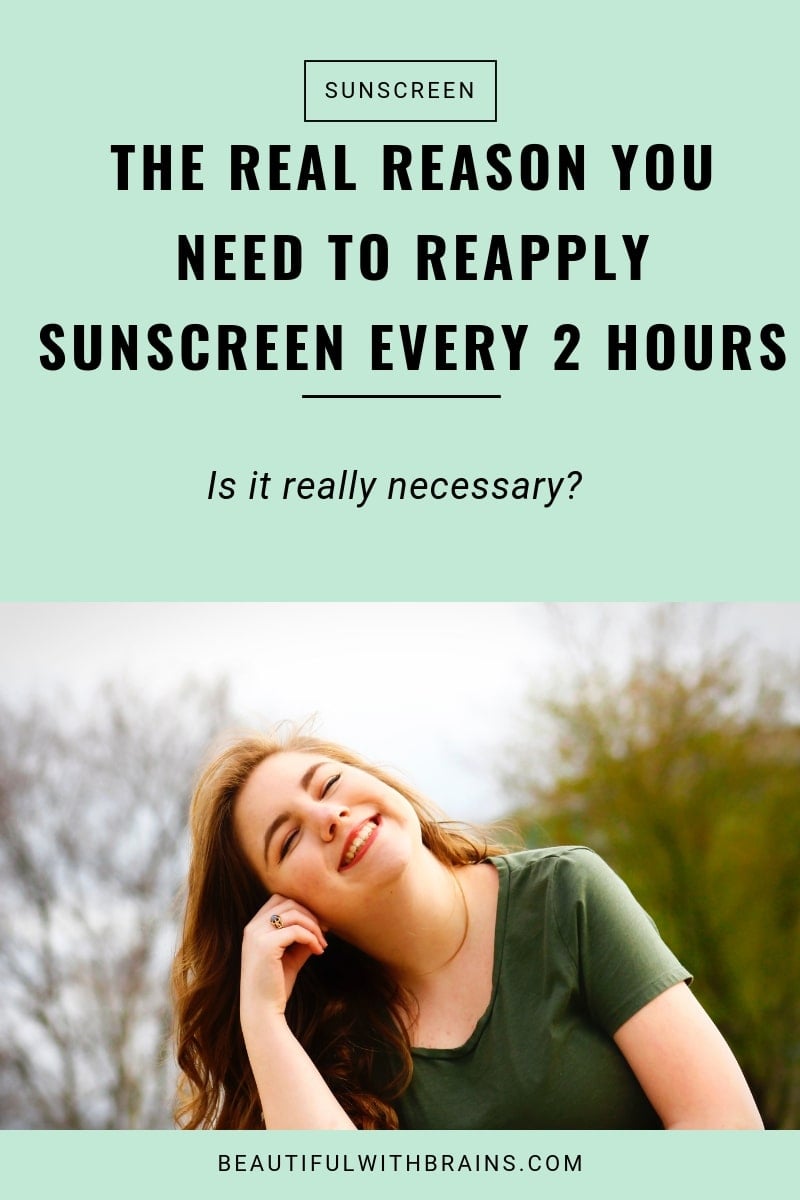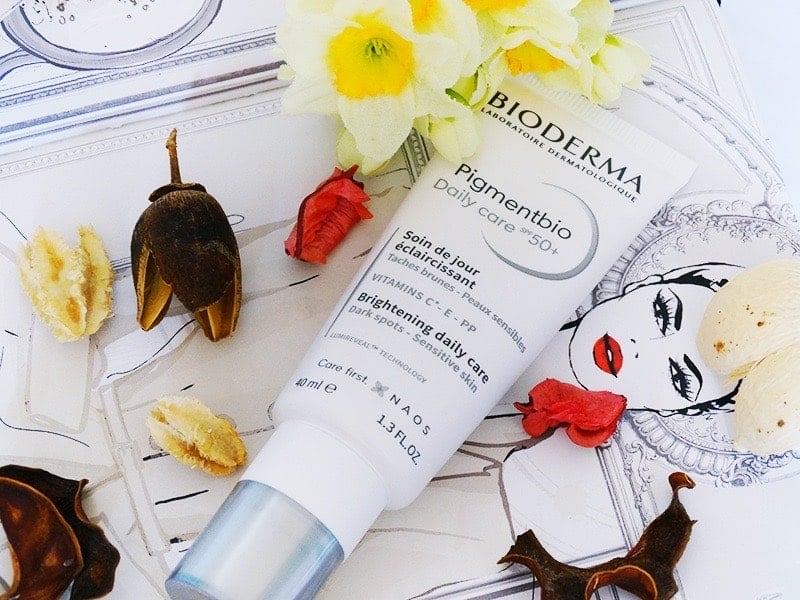
“Gio, do I really need to reapply sunscreen every 2 hours? I’m sitting in my office all day, it’s not like I have the chance to soak up the sun in a bikini…”
I hear ya. Reapplying sunscreen every two hours is cool at the beach, but do you need the hassle in your everyday life? Touching it up when you’re wearing a full face of makeup is something you’d rather NOT do – if you have the chance.
Do you have the chance?
Does Sunscreen Last The Whole Day?
You’ve probably heard that the SPF number determines the amount of time you can stay in the sun without burning. You calculate it by multiplying this length of time by the SPF number.
Let’s say your skin burns after 20 minutes without sunscreen. If you’re using SPF 30, you can safely stay in the sun for 10 hours (30 x 20 minutes = 600 minutes). That’s almost the whole day! Why the heck do you need to reapply sunscreen at all?
FYI, 10 hours is the theory. In practice, things work differently.
Remember, SPF is measured by scientists using a lamp that emits a constant stream of UV light. In real life, UV rays are more intense during certain hours of the day. Even with the same SPF, you’d burn faster at noon than in the early morning.
But wait, doesn’t that mean your sunscreen would last you even longer, then? Not so fast…
How effective is your sunscreen? Sign up to the newsletter below to receive the “Sunscreen Audit” Worksheet and find out if your sunscreen is really up to the job:
Sunscreens Wear Out Overtime
Remember the good old days when you could rely on math? 2+2=4 and all that jazz?
Sunscreen math is not so straightforward – or reliable. Just because in theory SPF 30 should last you 10 hours, it doesn’t mean it will. Chances are, your sunscreen becomes useless way before midday.
Here’s the deal: as they neutralise UV rays, UV filters become ineffective. The more UV rays they absorbs, the faster their death.
Dr Ellen Marmur better explains this in her book Simple Skin Beauty: “Chemical sunscreens don’t absorb the UV radiation as much as convert it into something benign (heat) that dissipates from the surface of your skin before it’s able to reach the collagen in the dermis and the DNA in your cells. Chemical filters intercept that radiation and transform it into something much less dangerous.
“The problem is that this photochemical reaction uses up sunscreen. Imagine that each chemical sunscreen molecule gets zapped and disappears the second it gets hit by a photon and converts to heat. Rather than wearing off, it is actually used up, like gasoline used by a car or food consumed by your body. That’s why it must be reapplied. The more sun you are getting, the faster sunscreen is used up or breaks down.”
At the beach, it usually takes around 2 hours to make your sunscreen completely useless. At the office? It’s impossible to tell.
It really depends on whether you’re working near big windows that let the sunshine through, how much you’re spending out of the office/house on any given day, what time of the day you’re exposed to all this sunlight…
As a rule, the sunnier the day, the more often you need to reapply it.
FYI, even though Dr Marmur is talking about chemical sunscreens, all sunscreens act this way. Technically, mineral UV filters (zinc oxide and titanium dioxide) are chemicals too. They break down as well, only more slowly.
Related: Chemical Vs Physical Sunscreen: What’s The Difference And Which One Should You Use?
How Quickly Does Sunscreen Break Down?
Here’s where it gets tricky.
Now, if you go for a swim or play a game of beach volley, it’s a given you need to reapply sunscreen immediately afterwards. All that sweat and exercise got a big dollop of sunscreen off your body and you need to top it up pronto.
But, what if you’re simply lying on the beach reading a good book? Or aren’t at the beach at all? Maybe you’re spending your day at the office and going out just for a brief errand. Do you need to reapply in that case?
As a general rule, the longer you stay in the sun and the strongest UV rays are, the quicker your sunscreen will break down and become useless.
Let’s say that you’re sunbathing at the beach. It’s 10 am and UV rays are pretty strong. You need to top up every couple of hours. No exception. Fail to do so and your sunburn will remind you.
If it’s a beautiful sunny day and you’re enjoying a picnic or a walk in the park with your friends, I’d still top up every couple of hours. UV rays are strong and you’re spending a lot of time outside, so better be safe than sorry.
If you’re spending most of your day indoors, away from windows, and venturing outside only to grab a quick coffee, your sunscreen will last a lot longer. UV rays won’t get much contact with it, so you may get away with topping it up only once a day.
If you’re indoors but close to a window, it’s another matter entirely. Glass blocks UVB rays, but UVA rays (the kind that causes wrinkles, dark spots and cancer) can still get through. Top your sunscreen up regularly. Every couple of hours as a rule, but if it’s a gloomy, cloudy day when UV rays are weaker, every 3 hours or so may be ok.
Related: Is Sun Exposure Through Glass Dangerous?

Poor Application, Swimming And Sweating
UV filters degrade overtime, but that’s not the only thing that makes your sunscreen useless within a few short hours. Here are the other culprits to look out for:
- Poor application: If you just apply a thin layer, it’ll get used up fast. Always apply the recommend amount to give your sunscreen the best chance to last as long as possible. That’s at least 1/4 of teaspoon for the face alone and a shot glass for the entire body.
- Swimming: No sunscreen is 100% waterproof. Some can last a little longer in the water, but you still need to apply them again once you get out.
- Sweating: If you’ve been working out at the gym, playing volleyball with your friends at the beach or just been sweating a lot (heck, some summer days are so hot, you’re sweating buckets even if you don’t move), the sunscreen will be melting away with the sweat. Reapply it often.
Related: How To Reapply Sunscreen While Wearing Makeup
The Bottom Line
Sunscreens don’t last forever. UV filters get used up while doing their job and wiped away when you’re swimming or sweating. Reapply yours as often as you can.
Do you reapply sunscreen as often as you should? Share your thoughts in the comments below.


If I’m at the beach .. sure .. I’m re-appying, but not on a normal day .. I probably should though 😛
Monica.
Monica, it’d be better to reapply on a normal day too, especially if you’re outside, or in front of windows, a lot. But, sadly, it’s so easy to forget, isn’t it?
Good reminder, Gio! Ideally I think we should reapply our sunscreen often. Practically, unless we don’t wear makeup or are at work, its really hard to adhere to this ‘rule’ 😛
Paris, I agree. Reapplying sunscreen when you’re wearing makeup isn’t very easy to do. I think the easiest way to do that would be with a powder with SPF, but they provide very minimal protection so I’d recommend that only to those who spend most of their day indoors anyway.
Indeed what about if you are at work the whole day, would you still need to reapply? I was always under the impression that when you are out the whole day in the sun re application is a must?
OH never mind I found your answer in this post: http://beautifulwithbrains.com/2011/03/08/is-it-really-necessary-to-reapply-sunscreen-every-2-or-3-hours/ love your blog!
Nilou, I’m glad you’ve found the answer to your question and that you like my blog. I hope to see you here often. 🙂
I would love it if sunscreens could really last all day. Though, I have to admit, I do use the right amounts. I slather it on pretty darn thick. Yay!
PS: I prefer physical sunscreens for sure.
Trisha, that would be wonderful! Who knows, maybe one day they’ll find a way to make it happen. In the meantime, I prefer physical sunscreens as they last a bit longer.
So what about if I apply suncream spf 50 at morning, it only takes me 10-15 minutes to drive to work and during my working hours I don’t get any UV exposure because my workplace has no windows. I do not sweat or get wet during work. Is my morning sunblock application still protects me when I leave work after 8 hours? I apply physical suncream always. I feel it does, but maybe I am not careful enough….
Karola, yes, in the case you described, the sunscreen you applied in the morning should still be good enough by the evening. I wouldn’t reapply.